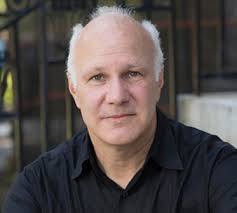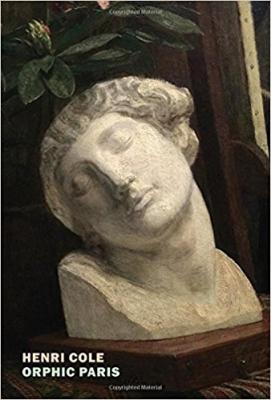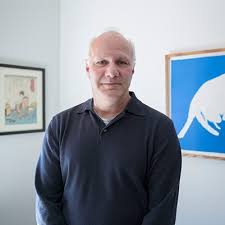In the seventeen companionable short essays of Orphic Paris, Henri Cole casts himself in the figure of a flâneur. “The crowd is his element,” said Baudelaire about the observantly incognito boulevardier of his own era. “The lover of life makes the whole world his family.” Cole’s ambit is usually more circumscribed than – but just as solitary as — those of his wandering predecessors such as Walter Benjamin. He walks along the Seine and through the parks. He visits museum galleries. He calls on and dines with his friends. He even takes a spin on the great wheel of La Grande Roue in La Place de la Concorde.
 From his apartment in the Fifth, he goes to the Jardin des Plantes, finds a bench, and reads Rilke’s “Blue Hydrangea.” Rilke was another notable walker of Paris, by turns inspired and appalled by the city’s scale and energy (as well as by everything else in the world). If Rilke meditated on and created his work through the tension between the enticements of life’s forms and the void that showed through them, Cole’s mind lavishes attention most often on opposing aspects of strictly personal experience.
From his apartment in the Fifth, he goes to the Jardin des Plantes, finds a bench, and reads Rilke’s “Blue Hydrangea.” Rilke was another notable walker of Paris, by turns inspired and appalled by the city’s scale and energy (as well as by everything else in the world). If Rilke meditated on and created his work through the tension between the enticements of life’s forms and the void that showed through them, Cole’s mind lavishes attention most often on opposing aspects of strictly personal experience.
“Here in Paris, there is a special mothering comfort, delight, and fulfillment for me, as if the real mother, with her mother tongue and mother heart, were coaxing me forward,” he writes in the next to last chapter. “There is no heaviness or melancholy.” The sentences remind me of lines in a favorite Cole poem, “Self-Portrait in a Gold Kimono”: “The essence of self emerges / shuttling between parents.” Cole’s “shuttling” is an unceasing, embedded gesture which feeds melancholy, which then triggers resentment, which finally renews his beckoning of love, beauty, and friendship. It pleases me that Cole’s claim of experiencing “no heaviness or melancholy” in Paris – at least in the moment he wrote that sentence — is sweetly mendacious, and true to his fluctuating temperament. “I want my poems to seem rebellious but also to be the servant of order,” he says.
 He quotes Rilke: “The life of great men is a road bristling with thorns, for they are utterly dedicated to their art.” It’s a set-up to take a swipe at the other parent. Cole writes, “I don’t want my life to be sidetracked from my dreams, like my father who enlisted as a soldier to escape the life of a sharecropper.” The son had been brought up in a strict Catholic household: “My father was a military man and my brothers were athletes, so I was always looking for a different way to be a man.” About his mother, he says, “On her deathbed, Mother told me that she had been lonely all her life.”
He quotes Rilke: “The life of great men is a road bristling with thorns, for they are utterly dedicated to their art.” It’s a set-up to take a swipe at the other parent. Cole writes, “I don’t want my life to be sidetracked from my dreams, like my father who enlisted as a soldier to escape the life of a sharecropper.” The son had been brought up in a strict Catholic household: “My father was a military man and my brothers were athletes, so I was always looking for a different way to be a man.” About his mother, he says, “On her deathbed, Mother told me that she had been lonely all her life.”
He endorses his own approach: “Sometimes, when I read a poem, if I sense no conflicted self – insolent, prating, hurt – I’m left thinking, is that all?” Inner conflict, especially as it addresses and flirts with aesthetic values (that is, as it portrays itself as gorgeous in its extremities), is sneered at in some quarters of American poetry today, replaced with political certainty, self-crediting knowingness, and bland memoirism, applauded by a narrow audience that agrees with everything in advance. Cole’s prose is streaked with a desire to see and express more than he may be able, to distill more from the materials that are native to him. He perceives the pitfalls along the route: “Sometimes when I look at art, all I see is ambition. And the same is true with poetry, when ambition is larger than talent.”
 His manner of phrasing his aspirations is disarmingly direct: “Poetry is different from fiction. Poetry is not a lie that tells the truth. A poem must burn with a truth-seeking flame and be a small symphony of language, too. Often my poems contain real events and real details from life, but I don’t want them to be like diary entries. I want to create an imaginative world that seems to be entirely my own, one that is neither confessional nor abstract.” The “mothering comfort” he finds in Paris isn’t divorced from personal turmoil. On the contrary, it seems to empower the balance required to enable a proper shuttling – to forge, in the poems, an accord between contrary, separated things. The consensus found in a poet’s work is not always – perhaps is only rarely – an attribute that the poet actually possesses as she or he ambles through the crowd.
His manner of phrasing his aspirations is disarmingly direct: “Poetry is different from fiction. Poetry is not a lie that tells the truth. A poem must burn with a truth-seeking flame and be a small symphony of language, too. Often my poems contain real events and real details from life, but I don’t want them to be like diary entries. I want to create an imaginative world that seems to be entirely my own, one that is neither confessional nor abstract.” The “mothering comfort” he finds in Paris isn’t divorced from personal turmoil. On the contrary, it seems to empower the balance required to enable a proper shuttling – to forge, in the poems, an accord between contrary, separated things. The consensus found in a poet’s work is not always – perhaps is only rarely – an attribute that the poet actually possesses as she or he ambles through the crowd.
“Why am I writing all this down, dear reader?” he asks to open Part XI. “The answer is because I don‘t want to conceal anything, or be surreptitious. Instead, I want to reveal something – everyday myths, fables, and allegories – that might otherwise remain dormant behind the intense beauty of Paris.” This chapter, elegantly discursive like the others, begins with Hugo’s The Hunchback of Notre Dame and the 1939 film adaptation with Charles Laughton. Here, Cole probes the notion of Beauty, the word’s derivation, and Hopkins’ poem “Pied Beauty.” Then, he recalls observing “a beautiful sleeping chipmunk,” and remarks on his own sleep, “a compensation for the little, banal degradations of everyday life.” At the end, the lovely and the ugly are gathered together:
“I am always aspiring to say something true in an atmosphere of beauty (beauty again!), connecting my inner and outer space. I think that as long as I have this inner dimension I will want to create something out of language to reveal what is there —in particular, the ghastly, insane, and cruel things.”
 These essays are built through a talent for friendship. He writes, “What matters in the life of a poet is the life of the imagination, and friendship – not bitterness or resentment – can nurture the thirsty soil of the poet’s mind.” In particular, Cole returns to episodes with his friend James Lord (1922-2009), the biographer of Giacometti and Picasso. He remembers, “James was speaking about Jean Cocteau, whom he met during the summer of 1950 at the urging of Picasso. But Cocteau ‘was not a generous person,’ James insisted, because he had ‘little capacity to empathize and listen.’ Is there any quality more important to friendship than the ability to listen?” Orphic Paris radiates with a profound desire to be heard. Listening, one moves with Cole through an envisioned, detailed world that feeds a salvaging fellowship.
These essays are built through a talent for friendship. He writes, “What matters in the life of a poet is the life of the imagination, and friendship – not bitterness or resentment – can nurture the thirsty soil of the poet’s mind.” In particular, Cole returns to episodes with his friend James Lord (1922-2009), the biographer of Giacometti and Picasso. He remembers, “James was speaking about Jean Cocteau, whom he met during the summer of 1950 at the urging of Picasso. But Cocteau ‘was not a generous person,’ James insisted, because he had ‘little capacity to empathize and listen.’ Is there any quality more important to friendship than the ability to listen?” Orphic Paris radiates with a profound desire to be heard. Listening, one moves with Cole through an envisioned, detailed world that feeds a salvaging fellowship.
[Published by New York Review Books on April 3, 2018. 176 pages, $15.95 paperback]